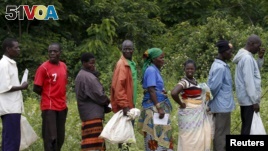Nov 29, 2016
This month, U.S. Ambassador to Malawi Virginia Palmer announced a new United States donation of 23 million dollars to assist the Malawian people in need of humanitarian food assistance. This additional donation is in response to the Malawi Vulnerability Assessment Committee's report that 6.5 million Malawians need humanitarian food assistance to alleviate suffering through March 2017. All of these funds will be channeled through the United Nations World Food Program.
Of the 23 million dollars, 18 million will be used to help fill deficits in pulses and super cereal needed for the 2016-2017 Food Insecurity Response Plan, while 5 million dollars will be used to purchase ready-to-use therapeutic food for HIV patients currently being treated with Anti-Retroviral Therapy, or ART.
The latter is particularly important to preserve gains made to date in HIV treatment, as malnourished patients tend to discontinue ART without access to food to ameliorate the treatment's side effects.

To further preserve development gains in other sectors, the United States government has also re-programmed 12 million dollars of previously planned investments in agricultural development and climate change adaptation programs.
These were longer-term investments that now have been re-directed to enhance the United States responsiveness to the dire food security situation Malawi currently faces. They are primarily food-for-work activities, whereby beneficiaries will receive food for their contributions to resilience-building measures, such as afforestation, soil and water conservation, and small-scale irrigation.
The additional assistance made available to Malawi brings the United States' total contribution to the 2016-2017 Food Insecurity Response Plan to nearly 118 million dollars, equivalent to about 30 percent of the Plan's 395 million dollars estimated cost.
Ambassador Palmer added that the United States will continue to work with the government of Malawi to break the cycle of food insecurity.
“The United States Government continues to stand by Malawians in their time of need. But, together,” said Ambassador Palmer,” we recognize that policy and market predictability are critical if Malawi's farmers are to become entrepreneurs, if agribusinesses are to invest, and if Malawi is to transform its agriculture sector from a source of vulnerability into an engine for growth.”